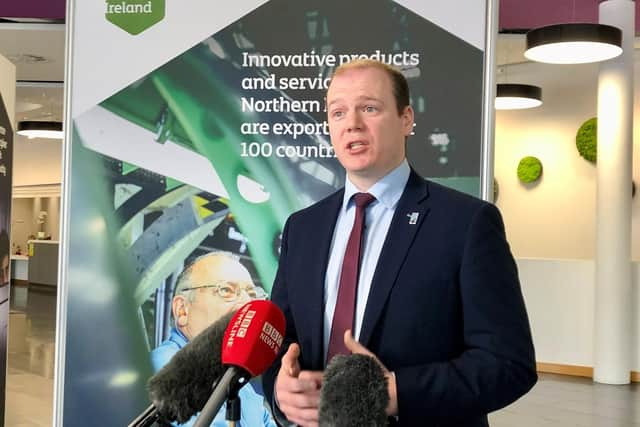Treasury must adopt same solution it applied in Wales to solve Northern Ireland's £2.3bn funding gap, says DUP
and live on Freeview channel 276
Stormont's budget has fallen by more than £2bn in real terms since 2021 due to the impact of inflation, according to the Department of Finance.
The department has published a financial context for revenue-raising measures which sets out the financial challenges facing the region.
Advertisement
Hide AdAdvertisement
Hide AdIt said that current funding of public services in Northern Ireland is £2.3bn lower than what would be required to maintain the same level of services as in 2021-22.


Northern Ireland Secretary Chris Heaton-Harris wrote to senior civil servants last month, directing them to launch public consultations on measures to support budget sustainability and raise additional revenue.
These include potential measures such as introducing domestic water and waste water charges, drug prescription charges, and increasing university tuition fees.
However DUP Finance spokesman Gordon Lyons responded that the funding model for UK regions is short-changing Northern Ireland compared to other nations.
Advertisement
Hide AdAdvertisement
Hide Ad"Whilst Chris Heaton-Harris talks about more taxes, any additional revenue raised would be negated if the funding model is not revised,” the former Stormont Economy Minister said.
“The Treasury contribution to fund public services in Northern Ireland is going down rather than rising. As an example, in England up to 2025, spending will increase by 6% but only 3.6% in Northern Ireland.
“We don’t benefit from economies of scale like GB.
“Unless there is a recalibration of how Northern Ireland is funded, the situation will only get worse. The UK Government have defined how need’ should be measured and the NI Fiscal Council has consistently found that NI’s funding envelope falls short of meeting our ‘need’.
"Wales found this problem more than a decade ago and it has now been resolved. The same mechanism can be used to resolve the issue in Northern Ireland.
Advertisement
Hide AdAdvertisement
Hide Ad“For decades Northern Ireland’s infrastructure was in stagnation and as a result it needs mammoth investment which we cannot afford, yet to stand still means houses, hospitals and schools will struggle to get built.”
The Alliance Party accused Mr Heaton-Harris of imposing “punitive” revenue raising measures on NI.
Spokesman Eoin Tennyson said: “The £2.3bn squeeze on Northern Ireland's budget in real terms between 2021 and 2024 lays bare the scale of financial pressure our public services are under. In this context, it is clear the Secretary of State's punitive proposals for revenue-raising are both a sticking plaster and a cynical distraction from the fundamental drivers of the current crisis.”
While Stormont ministers would have to make decisions on any revenue-raising measures, Northern Ireland is currently without devolved powersharing institutions due to the DUP's protest against post-Brexit trading arrangements.
Advertisement
Hide AdAdvertisement
Hide AdSenior civil servants are currently running public services in the region in the absence of a multi-party Executive.
Mr Heaton-Harris, who has asked for a review of domestic and non-domestic regional rates, previously said generating revenue to balance the Stormont budget is a "critical necessity".